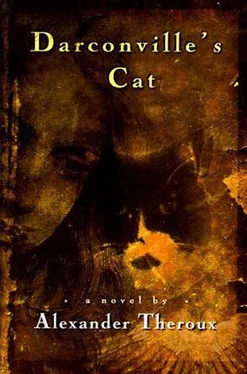Paper is patient. The creative pen kept to the receptive paper — it leapt to use, through every phase of perception, with thoughts, unsummoned and unannounced, pensioned out of the blandishments of common reality, constantly stealing upon him for inclusion, transmitted down through the memory of those who lived in ancient times, races illimitable, to be resumed across the years in all the emotions, passions, experiences of the millions and millions of men and women whose lives of love and the loss of it insensibly passed into his own and so composed it. The room itself was a lesson compacting his goal: there was absolutely nothing else to do but write. He wrote doggedly, stopping only to rotate his wrist to relieve a graphospasm or to try to press an ache out of his diaphragm. He wrote desperately, searching the past, as fear picks out objects in the dark, to identify what would otherwise forever loom as phantoms to his sight. When there seemed to be nothing left, he slept, then rose again to write — no, not with an elevation available at will, but through the whispering of innumerable responsive spirits within him that stirred like the invisible motions of the mind wavering between dreams and sleep to remind him that out of fatal mortality could be snatched something in the life of the world that did not participate in disintegration but could transfigure it. The end, indeed, was near. And then one night, alone, with only the Holy Logoi standing above him in a thousand diaphanous shades of ether, Darconville looked under his hand and found that from disorder — from the spectacle of order that was so vast it only resembled disorder — a civilization had emerged. Future became a fiction. The work was finished at last.
It was March by now. A deep peripneumonia had set in, causing pooling of secretions in Darconville’s lungs, the exudation of pus, and the dissolution of already scarred mucosa. Small blood vessels were rupturing, sending up viperish clots of black blood in remorseless acceleration. The inadvertent swallowing of clots produced nausea and retching which the doctor sought to check by drastically limiting his food. At first, he thought he would utterly go mad from hunger, but soon he could eat nothing solid without suffering immediately, neither the loathly bowls of milksop which appeared at every meal nor the whimsical remedies — jills of broth, lac ammoniacum, and the mixtures of vulnerary roots of plants — which the old lady credulously hoped might overcome this terrible illness that by now had set all medicines at defiance. He lay silent, flushed with fever, the only sound being his labored breathing and the clup-a-clup of tongue upon arid palate. Curiously, he kept the manuscript by him, as if reluctant to surrender it, sometimes reaching weakly for a page to add a note, to turn a phrase, to knock off the waste marble. Suddenly the fever, denominated ardent and inflammatory, rose higher, ushering in a bounding pulse and a hammering pain in the head. There was a coarse twitching of his muscles and impossible congestion. The manuscript was placed in a black tin box.
Darconville had now come under the shadow. His body was completely extenuated by the hectic fever and colliquative sweats which mutually succeeded one another, the one towards night, the other in the morning — and then he was cold, a chill creeping over him like another emotion sent to temper one already there, too absolutely there, a terrible and unresolvable complementarity in which radically opposed but equally total commitments to the meaning of life seemed to coexist in what became a single phenomenon that, irreconcilably, was also and was at the same time nevertheless the secret at the center of all truth. Under his bedclothes at night he shook like jelly, unable to think for cold. He was no longer able to turn in the bed. An unpleasant odor, like dissolution itself, emanated from his cold sweat. His mouth was cold. His cheeks were cold, hollow, withering into themselves. He could feel an inrush of bitter cold from the window through which, silently, he watched the night-by-night movement of the moon eastward through the stars. Distance was a mocking vision to his fever-lurden eyes, but he said nothing, for when a person’s trouble comes down to the final intimacy he gives no one access to it. Custodi nos, custodi nos , he thought as he lay there awaiting the resolution of the mystery, for the lights of heaven itself were dim. The very stars wandered.
It was a windy, whispering moonlit night in Venice, the frost-fog looping around the lower sky in mid-March when Darconville was hit with a sudden eruption in the forepart of his chest, a slam that gave him such violent pain when he sprang up to gasp for breath that he quickly drew in his bowels to prevent the motion of the diaphragm. He screamed out in agony, as his back seemed to break. The old lady, praying the rosary in a corner, crashed over a chair spilling a posset of tea as she rushed to wash his mouth of spittle, at first thin, then becoming grosser and streaked with blood, now filling his throat as infection eating through the weakened wall of a bronchial artery tore through a rupturing bulla, fragile from repeated coughing spasms, and boiled into his lungs. He clutched for the old lady’s hand, impossibly trying to say something — but, heaving, vomited up a tremendous rush of bile and blood and, completely beyond himself, incapable of explanation, he suddenly couldn’t speak. Confusion, utter and horrible, surrounded him, because confusion was complete within.
Astonished, he leapt to his feet in the grip of massive shock.
It was as if, evacuating at every step — his wild protesting hands streaming with blood — he were being driven backwards with each violent convulsion. But the hands were reaching out as his brain, fleeing the onrushing hypoxia, was rapidly flashing images he was unable to control, and with memory distorted in the replaying reflexes of acute cerebral damage he for an instant actually looked into the past ! He seemed to be struggling out of the hematosis in an attempt to describe or call upon something he couldn’t yet see, and then with a terrible snorting noise which seemed, as it rose through the phlegm filling his throat, to burst his nose in a lethal explosion of bright blood that spattered all over the bed and sheets and cold floor, he tried to speak— mouthing words that wouldn’t form. Groping blindly, he made a motion with his hands as if something were coming towards him and stumbling forward, just before he fell, reached up in a last fatal moment of blindness to cry out inexplicably and desperately and loud, “ My cat! My cat !”
Then something came towards him at last.
Like as it was with Aesopes Damosell, turned from a Catt to a Woman, who sate very demurely, at the Boards End, till a Mouse ranne before her.
— FRANCIS BACON
The Black Duchess , a 15,000-h.p. tanker built specifically to carry liquid cargoes, was meanwhile steaming back up the Atlantic with Gilbert and Isabel van der Slang on board. They had been married, on deck, by the ship’s captain on March 13 with no relatives in attendance and spent their honeymoon on the island of St. Maarten by the Virgin Islands. There had been no announcement of the wedding beforehand. A small notice of the event appeared one week later on page six of a Charlottesville newspaper with no other details, no mention of witnesses, and no accompanying photograph.
Attired with stars, we shall forever sit triumphing over Death and Chance and Thee, O Time.
— JOHN MILTON
IT WAS FIVE O’CLOCK in the morning, the earth’s shadow still undisturbed by dawn, when a municipal traghetto took Darconville’s body across the grey Rio dei Mendicanti to the mortuary of the Ospedale Civile for the post-mortem examination. The chimes of the Campanile sounded the hour through the fog. The burial took place after a fortnight’s delay on the cemetery island of San Michèle in a reused gravesite, dug out of the frozen ground when the sketching of clouds on the dismal horizon, after that interval, blew in a cold rain. There were no mourners, no rites, and no funerary exequies other than that of a recitation over the coffin by a Capuchin friar who read from a simple hymn:
Читать дальше












